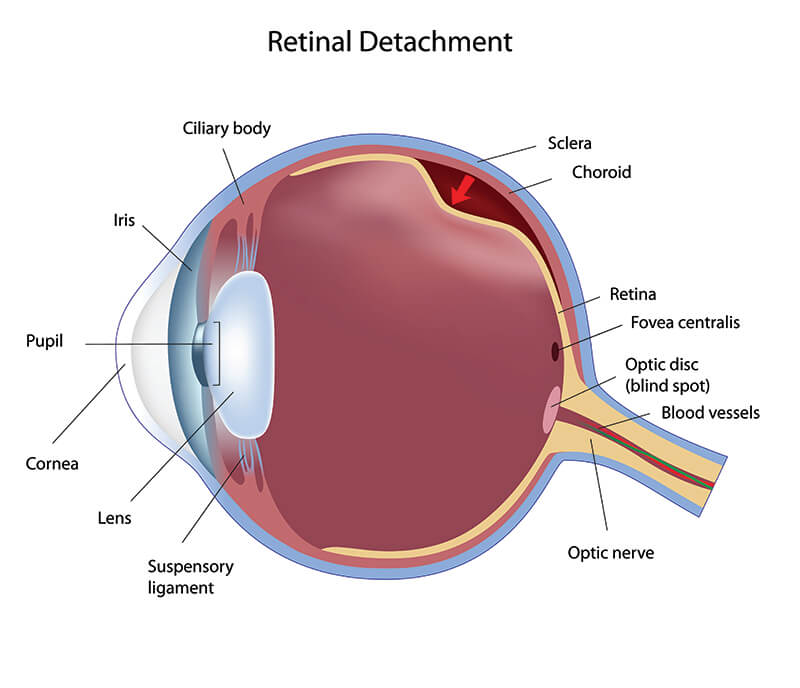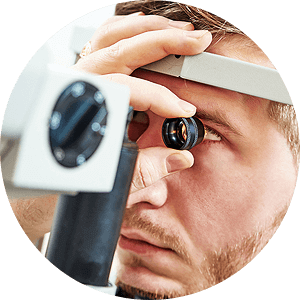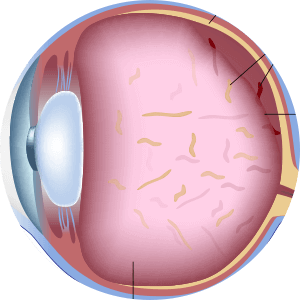Retinal Detachment Treatment in Manhattan
What is a Retinal Tear?
The middle interior of the eye is filled with a gel-like substance called vitreous. The vitreous is attached to the retinal wall. As we age, the vitreous begins to shrink and pull away from the retina. Generally, this is not an issue, and the space left in between the retina and the vitreous is filled with natural fluids. Other times, the fibers of the vitreous may be attached more firmly and as the rest of the vitreous shrinks back, the fibers pull on the retina. When this happens, the pulling may cause small holes or tears in the retina. The fluids that once filled the space between the retina and the vitreous may start to seep through the tears, leaving the eye at risk for retinal detachment.

What is a Retinal Detachment?
A retinal detachment occurs when the retina lifts off the back of the eye – much like wallpaper can separate from the wall. Generally, retinal detachment starts with a retinal tear. When the fluid inside of the eye seeps through the retinal tears, the fluid will cause the retina to lift off the back of the eye. Retinal detachment can happen with no warning symptoms, but often flashes and floaters can be warning signs of retinal tears.
What are the Symptoms of Retinal Detachment?
A detached or torn retina is not painful, but some symptoms include:
- Flashes of light
- Seeing “floaters” in vision
- Darkening of your peripheral vision.
If you notice any of these symptoms, contact your eye doctor as soon as possible.
How do you Treat Retinal Detachment?
There are many ways to treat a retinal detachment.
- Thermal (laser) or cryopexy (freezing) therapy.
- Pneumatic retinopexy
- Scleral buckle
- Vitrectomy
What are the Types of Retinal Detachments?
There are three different types of retinal detachment to be aware of:
- Rhegmatogenous
- Tractional
- Exudative
What Causes Retinal Detachment?
Since there are numerous types of retinal detachments, there are a variety of possible causes for each type:
Rhegmatogenous: The most common cause of rhegmatogenous retinal detachment is aging, but your risk of developing retinal detachment can be increased by eye injuries, nearsightedness, or eye surgery.
Tractional: The most common cause for this form of retinal detachment is diabetic retinopathy. Some other possible causes include eye infections, eye diseases, or swelling in the eye.
Exudative: This form of retinal detachment is caused by leaking blood vessels or swelling in the back of your eye. There are several potential reasons for leaky blood vessels or swelling in the back of your eyes. These reasons include a tumor in the eye, coats disease, injury or trauma to the eye, and Age-related macular degeneration (AMD).
Can Retinal Detachment Heal on its own?
Unfortunately, a retinal detachment will not heal its own. If you think you may be at risk of developing retinal detachment, schedule a consultation as soon as possible. The sooner retinal detachment is treated, the better chances you have at keeping your vision.
How Quickly Should Retinal Detachment be Treated?
If you notice any floaters, flashing lights, or any other changes in your vision, please schedule an appointment as soon as possible. The longer you wait to treat retinal detachment, the more serious the surgery will be to repair it. It also could leave you with permanent vision damage if ignored.
Your doctor will determine the best course of treatment for your individual situation. If you have any other questions about retinal detachment or if you are showing symptoms, give Angioletti Retinal Associates a call today!



